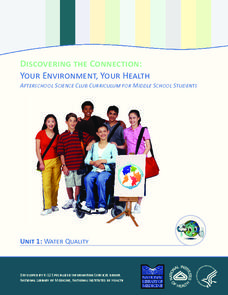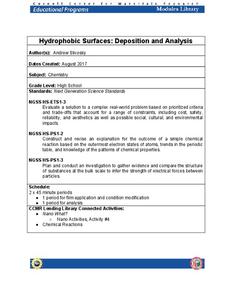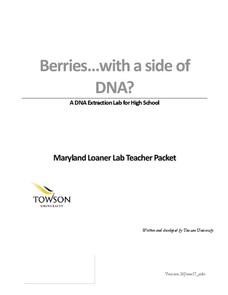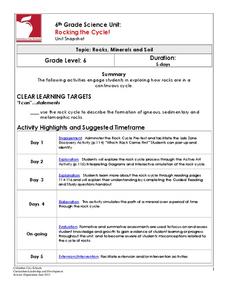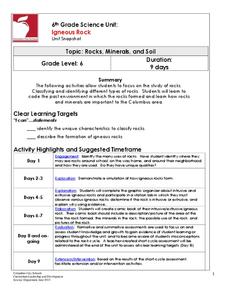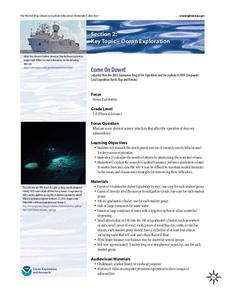National Library of Medicine
Your Environment, Your Health: Food Safety
Did youknow that chicken causes the greatest risk of food-borne illness. The fourth unit in a six-part series addresses food safety. Scholars research common scenarios of food causing illness through the National Institute for Health....
National Library of Medicine
Your Environment, Your Health: Water Quality
How important is water quality where you live? The first module in a six-unit series includes four lessons on water quality. By applying the concept directly to the lives of pupils, they engage in meaningful learning. They read about...
Oceanic Research Group
Heat Transfer and Cooling
Astronauts train underwater to simulate the change in gravity. An out-of-this-world unit includes three hands-on activities, one teacher demonstration, and a discussion related to some of the challenges astronauts face. Scholars apply...
Cornell University
Hydrophobic Surfaces—Deposition and Analysis
Couches, carpets, and even computer keyboards now advertise they are spill-resistant, but what does that mean? Scholars use physical and chemical methods to coat surfaces with thin films to test their hydrophobic properties. Then they...
Cornell University
Buoyancy
Swimmers know to float by turning their bodies horizontally rather than vertically, but why does that make a difference? In an interesting lesson, scholars explore buoyancy and the properties of air and water. They test cups to see which...
Towson University
Looking Into Lactase: Guided Inquiry
Milk does a body good ... unless, of course, someone is lactose intolerant. Pupils play the role of pharmaceutical scientists in a guided inquiry lab about lactase. Lab groups collaborate to learn more about lactose intolerance, how...
Towson University
Berries...With a Side of DNA? (High School)
Is DNA still present after picking fruit or cooking vegetables? Biology scholars extract and collect DNA strands in an impactful lab. Working groups prepare their samples and compare their results to negative and positive standard...
Towson University
Mystery of the Crooked Cell
Can your class solve the Mystery of the Crooked Cell? Junior geneticists collaborate to learn about sickle cell anemia in a fascinating lesson plan. The included materials help them to examine the genetic factors behind the disease...
Cornell University
Forensic Science: Case of the Missing Diamond Maker
Someone stole a diamond-making machine. Who done it? Scholars use forensic science at six different stations to determine the culprit. They analyze fingerprints, use their senses, and complete chemistry experiments to determine the...
Astronomical Society of the Pacific
Getting Ready for the All American Eclipse!
Give your pupils a front row seat at the biggest light show in the sky this year! In addition to admiring the total solar eclipse, young astronomers can explain the phenomenon with a little help from an inquiry-based instructional...
McGraw Hill
Population Biology
The carrying capacity of an environment varies based on the organisms that live there. Using a virtual lab simulation, scholars test two protists living in their own environments and a third environment where both protists live. They...
University of Minnesota
Do the Stroop
The Stroop test helps diagnose executive function disorders when used in conjunction with other tests. Reading color words and identifying colors seem like basic skills, but the Stroop test may show otherwise. Scholars work with a...
Nature Works Everywhere
Recording the Rainforest
Animals have evolved to communicate in different frequencies so they can hear each other throughout the rainforest. The first lesson in a three-part series begins by exploring an interactive story map online about the Borneo rainforest....
American Chemical Society
Preparation and Combustion of Biodiesel
The United States is the world's largest producer of biofuel. During an in-class investigation, young scientists produce their own biodiesel. They burn a sample of it to determine the heat of combustion. Then they discuss the results...
American Physiological Society
Effects of Environment on Enzymes
Much like the tale of Humpty Dumpty, proteins, once altered, will never be the same again. Honors and pre-AP biology classes explore the delicate world of enzymes via a Webquest and lab experiment. The teacher's guide contains all...
University of Minnesota
Mirroring Emotions
Do you ever give your class the "teacher look"? Without saying a word, they become silent and engaged (hopefully). How do they know what you're thinking? Explore the concept of nonverbal communication and how it relates to our mirror...
Columbus City Schools
Changes All Around Us
Whoa! What just happened? That's right, change is everywhere. But what exactly is changing? Middle school science sleuths get to the bottom of the changes matter can experience. Through simple demonstrations, engaging videos, and an...
Columbus City Schools
Rocking the Cycle!
Time to rock out! Discover the "life" cycle of the average rock using an illustrative stations lab and stimulating pairs game. Roll the dice to determine your fate: will it be melting in magma or chilling out to form igneous rock? The...
Columbus City Schools
Igneous Rock
These rocks are HOT! Well, they used to be, anyway. Take young geologists on a two-week journey through the life and times of the average igneous rock. Lab groups work together to hypothesize about intrusive and extrusive igneous rock...
Columbus City Schools
ABC: Acid Base Chemistry
Bubble, bubble, boil and trouble! What causes common substances like baking soda and vinegar to react the way they do? Welcome your junior chemists to the wonders of acid-base chemistry using a comprehensive and fun resource. Engage them...
Columbus City Schools
To Measure its Mass or Volume?
Atoms, elements, and molecules, oh my! Teaching the fundamentals of chemistry to curious sixth graders has never been easier to accomplish. Here is a resource that pulls together everything needed to get them off to a good start,...
American Physiological Society
Sticky Adaptations A Lesson on Natural Selection
Now you see it, now you don't! The stick bug exhibits the ability to disappear into a wooded environment. Why does this adaptation manifest in some species, but not in others? Life science students explore animal adaptations in nature...
American Physiological Society
Drug the Water Flea
This is a flea. This is a flea on drugs. Any questions? Your class will have questions aplenty during an impactful experiment. Lab groups get to know Daphnia magna, the humble water flea, and study the effects of stimulants and...
NOAA
Come on Down!
What do we do when a dive is too dangerous for humans to accomplish? Send in the robots! Middle school scientists get acquainted with several different models of submersible robots in the second lesson of six from NOAA. Lab groups then...



